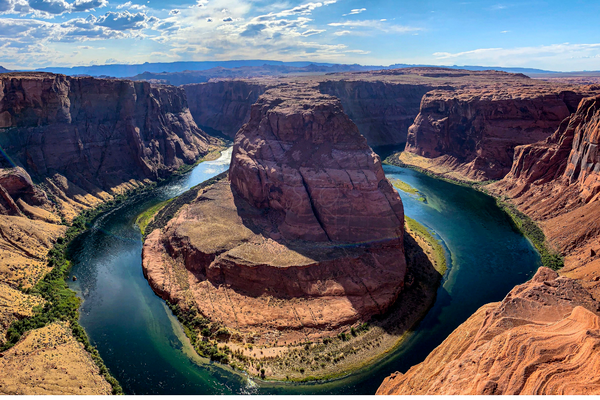
- Details
- By Native News Online Staff
“Seeing lawmakers from both sides of the aisle come together to tackle this challenge is an acknowledgment of the emergency we face,” said Garrit Voggesser, director of the National Wildlife Federation (NWF) Tribal Partnerships Program, in a statement on March 27. “This is a very real and urgent problem that requires collaborative partnership with Tribes and Indigenous organizations in the region.”
In the Senate, the caucus was launched in February as an informal group by Democratic Senator John Hickenlooper and has expanded to include senators representing the seven Colorado River basin states—California, Arizona, Nevada, New Mexico, Utah, Colorado and Wyoming.
On March 15, the House of Representatives announced the formation of their version of the Congressional Colorado River Caucus, which includes bipartisan lawmakers from states along the Colorado River Basin —Arizona, California, Colorado, Nevada, New Mexico and Utah. The House’s caucus is co-led by Congressman Juan Ciscomani (R-AZ).
The Colorado River flows for approximately 1,450 miles. It provides water to seven states in the Western U.S. that comprise the Upper Basin — Colorado, New Mexico, Utah, and Wyoming — and the Lower Basin — Arizona, California, and Nevada. 40 million people, including members of 30 federally recognized tribes, rely on the river for their water supply.
Organizations such as the Ten Tribes Partnership and Water and Tribes Initiative have been advocating for Tribal water rights along the Colorado River for years. According to a statement from the NWF, the caucuses will collaborate with tribes to strategize solutions to the river’s depleting supply.
A representative from the NWF Tribal Partnerships Program was unable to provide a comment to Native News Online regarding the caucus and involvement of tribes.
“Colorado River Basin Tribes have recognized rights to use 3.2 million-acre feet of Colorado River system and an immeasurable amount of knowledge and expertise to bring to the table,” Voggesser said in a statement.
A dozen of the tribes in the Colorado River Basin, including the Navajo Nation, still have at least some “unresolved” water rights, meaning the Tribes’ claims to water have yet to be argued and agreed upon.
Last week, the Navajo Nation argued before the Supreme Court that the Dept. of Interior is shirking a 150-year-old treaty obligation to develop plans to provide future adequate water supply to the reservation. A decision is expected in the coming months.
In the fall of 2021, more than 20 tribes signed a letter to Interior Secretary Deb Haaland in which they pressed for direct, sustained involvement in renegotiating the guidelines that manage the Colorado River, which are set to expire in 2026.
More Stories Like This
Gwich'in Tribal Governments Submit Comments Challenging Fish and Wildlife Service's Inadequate Environmental Review of Arctic Refuge Snow RoadRappahannock Tribe Challenges 9M-Gallon Water Plan
Feds release draft long-term plans for Colorado River management
Apache Leader Walks 60 Miles to Court Hearing That Will Decide Fate of Sacred Oak Flat
Rappahannock Tribe Raises Sovereignty and Environmental Concerns Over Caroline County Water Permit
Help us defend tribal sovereignty.
At Native News Online, our mission is rooted in telling the stories that strengthen sovereignty and uplift Indigenous voices — not just at year’s end, but every single day.
Because of your generosity last year, we were able to keep our reporters on the ground in tribal communities, at national gatherings and in the halls of Congress — covering the issues that matter most to Indian Country: sovereignty, culture, education, health and economic opportunity.
That support sustained us through a tough year in 2025. Now, as we look to the year ahead, we need your help right now to ensure warrior journalism remains strong — reporting that defends tribal sovereignty, amplifies Native truth, and holds power accountable.
 The stakes couldn't be higher. Your support keeps Native voices heard, Native stories told and Native sovereignty defended.
The stakes couldn't be higher. Your support keeps Native voices heard, Native stories told and Native sovereignty defended.
Stand with Warrior Journalism today.
Levi Rickert (Potawatomi), Editor & Publisher


